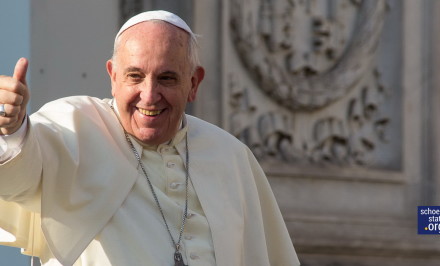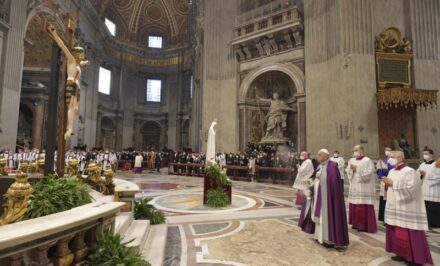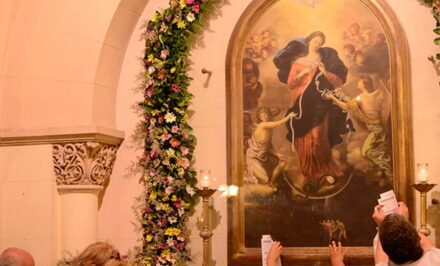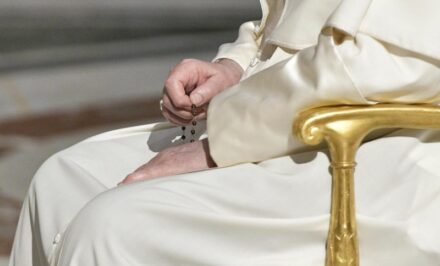 mda. Pope Francis surprises us and upends many of our secure outlooks on life. Stereotypical images of our enemies, about which we were so certain, such as, “the media who are always against the church and the Pope” collapse, while many “very” Catholic media and commentators, which liked to label themselves as “faithful to the Pope”, suddenly find that they are having difficulties with him. There are quite a number of Christian journalists and opinion makers who sow suspicion and accuse the Pope of creating confusion among the Faithful. On the Solemnity of the Blessed Mother, schoenstatt.org published a clear and forceful letter (in Spanish) from Bishop Domenico Sorrentino of Assisi, which was first published in the Italian newspaper La Voce and publicised by the network Aleteia. It does us good to rely on courageous bishops, who are honest men without fear of the truth – living witnesses to a renewed Church and the Lord, in selfless service like Mary.
mda. Pope Francis surprises us and upends many of our secure outlooks on life. Stereotypical images of our enemies, about which we were so certain, such as, “the media who are always against the church and the Pope” collapse, while many “very” Catholic media and commentators, which liked to label themselves as “faithful to the Pope”, suddenly find that they are having difficulties with him. There are quite a number of Christian journalists and opinion makers who sow suspicion and accuse the Pope of creating confusion among the Faithful. On the Solemnity of the Blessed Mother, schoenstatt.org published a clear and forceful letter (in Spanish) from Bishop Domenico Sorrentino of Assisi, which was first published in the Italian newspaper La Voce and publicised by the network Aleteia. It does us good to rely on courageous bishops, who are honest men without fear of the truth – living witnesses to a renewed Church and the Lord, in selfless service like Mary.

We are in the midst of a “post-modern” world. Behind us the great systems. In the spotlight of the global market an infinite number of opinions, but only opinions. It is the time of “what suits me”. It also happens with religion.
At the latest lowest point this attitude towards life includes the Pope. Yes, precisely, Pope Francis. Even though he is not standing in the dock, he has nevertheless landed in the dock of the opinion-makers. They examine and evaluate him, and he doesn’t get very good marks in everything. It was to be expected after the first time he mingled with the crowds and they responded with approval.
In the process the fact escapes us, that already from the first moment of his pontificate, when he stood up powerfully for the poor – which is in fact the sign of classic Christian social teaching – lobbies in the financial world showed their disdain, and so did … journalists. With all due respect, such a reaction is almost a guarantee that the product is good and in keeping with the Gospel.
Nor is it surprising – its opposite would have been a surprise – that some ultra-conservative Catholic groups and extreme opponents of the Second Vatican Council immediately placed Pope Francis into the same sack as the “heretical Popes”. Indeed of the “anti-Popes”, but, on the other hand, in the best company of Popes whom we already honour as Blessed, and one, Pope John Paul II, even as a saint! At real peace with them all.
The recent news comes surprisingly from Catholic journalists who definitely and deservedly represent Christian witness, but who now feel duty bound to distance themselves from Pope Francis. They call it a decision in conscience, and as we know, that has to be respected. But it is by no means the truth.
In addition, they confess their faith, and accept the Council up to the post-conciliar Popes. Up to Benedict XVI. Francis, they say, with his mediocre speeches and (supposed) subliminal strategies of renewal (we need only think of the Family Synod) creates confusion in the Church. So the hour has come for the prophets who will attack this danger.
They even spread the suspicion, with badly hidden demands for journalistic exclusivity, that Francis is not the true Pope. Pope Benedict XVI is still at the helm of the Church, even though on “standby”. This is based on the title of “Pope emeritus”, which he has retained, and the suspicion that the Conclave that elected Bergoglio was irregular.
That such a destabilising thesis has no foundation can easily be proven by any moderately good canon lawyer. Especially in view of the election, the suspicion is totally up in the air as the fruit of journalistic speculation about an event – the Conclave – covered by the strictest regulations of secrecy that prevent any examination.
The thesis – or even the suggestion of a possible hypothesis – is spread with the art of perfect journalism and a certain pathos of heroes who stand up for genuine and pure truth, with the obvious intention of bringing about the rejection of Pope Francis (or at least confusion about him). The whole thing is motivated by the supposed limitations of the Magisterium of the present Pope, who is contrasted with the qualities of the Pope emeritus. The two, we are told, are in opposition.
We who love them both cannot see the least trace of a contradiction, even thought the style of both Popes could not in fact be more different. Whoever follows the Magisterium of Pope Francis attentively, and not with gritted teeth, and at least knows his mind formed by the Gospel, will realise that it is truly incredible for him to be accused of creating a fan club by saying what everyone wants to hear. Exactly the opposite is the case.
I can well remember the vigorous box on the ear he gave us when he visited Assisi. He did not say what we wanted to hear, but things that made us panic. Yet we could accept it because of the simplicity and kindness with which he said it, including things that were very difficult to believe and apply to life. He adopts arresting sayings that centre on the proclamation of God’s mercy. But it is the purest Gospel.
If you take in the totality of the Magisterium until now, nothing has been forgotten that constitutes the unchangeable truth, nor any of the duties of a good conscience. Of course, if someone only selects “what suits me”, what interests me, from the market of religion, we can and must feel sorry for them. But it is difficult that as a result they have a right to practice “what suits them” in the name of prophecy, and in the process choose a Pope that suits them.
From Bishop Domenico Sorrentino of Assisi, Italy














